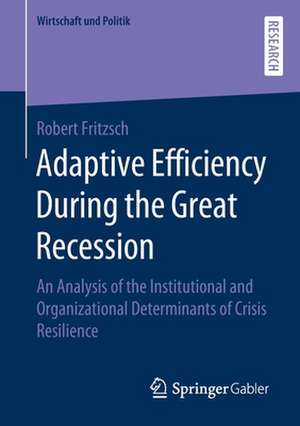Adaptive Efficiency During the Great Recession: An Analysis of the Institutional and Organizational Determinants of Crisis Resilience: Wirtschaft und Politik
Autor Robert Fritzschen Limba Engleză Paperback – 9 aug 2019
Preț: 642.36 lei
Preț vechi: 755.72 lei
-15% Nou
Puncte Express: 964
Preț estimativ în valută:
122.91€ • 128.33$ • 101.73£
122.91€ • 128.33$ • 101.73£
Carte tipărită la comandă
Livrare economică 04-18 aprilie
Preluare comenzi: 021 569.72.76
Specificații
ISBN-13: 9783658274085
ISBN-10: 3658274085
Pagini: 379
Ilustrații: XVI, 379 p. 45 illus.
Dimensiuni: 148 x 210 mm
Greutate: 0.47 kg
Ediția:1st ed. 2019
Editura: Springer Fachmedien Wiesbaden
Colecția Springer Gabler
Seria Wirtschaft und Politik
Locul publicării:Wiesbaden, Germany
ISBN-10: 3658274085
Pagini: 379
Ilustrații: XVI, 379 p. 45 illus.
Dimensiuni: 148 x 210 mm
Greutate: 0.47 kg
Ediția:1st ed. 2019
Editura: Springer Fachmedien Wiesbaden
Colecția Springer Gabler
Seria Wirtschaft und Politik
Locul publicării:Wiesbaden, Germany
Cuprins
Political Institutions, Interest Group Activity and Crisis Resilience.- Economic Institutions and Crisis Resilience.
Notă biografică
Robert Fritzsch is research associate at the chair of institutional economics and economic policy at the University of Erfurt.
Textul de pe ultima copertă
Robert Fritzsch provides an institutional economic analysis of the Great Recession. The author shows that institutions matter as determinants of crisis resilience - however in a different way than predicted by the prominent theories of Olson (1982) and North, Wallis, Weingast (2009), as the crisis was most severe in developed countries with democratic political institutions, rule of law and restrained regulations. The empirical results support theoretical predictions only within the sub-group of developed countries, where rule of law and restrained regulations show a positive association with crisis resilience.
Contents
Target Groups
About the Author
Robert Fritzsch is research associate at the chair of institutional economics and economic policy at the University of Erfurt.
Contents
- Political Institutions, Interest Group Activity and Crisis Resilience
- Economic Institutions and Crisis Resilience
Target Groups
- Scholars and students of economics, political science, and sociology
- Politicians, public employees
About the Author
Robert Fritzsch is research associate at the chair of institutional economics and economic policy at the University of Erfurt.
Caracteristici
Publication in the field of institutional economics


